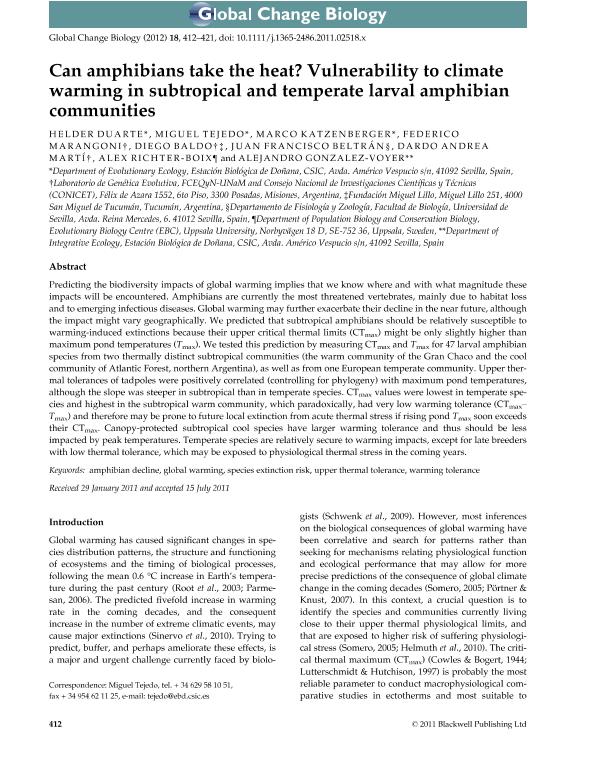Artículo
Can amphibians take the heat? Vulnerability to climate warming in subtropical and temperate larval amphibian communities
Duarte, Helder; Tejedo, Miguel; Katzenberger, Marcos; Marangoni, Federico ; Baldo, Juan Diego
; Baldo, Juan Diego ; Beltrán, Juan Francisco; Marti, Dardo Andrea
; Beltrán, Juan Francisco; Marti, Dardo Andrea ; Richter Boix, Alex; Gonzalez Voyer, Alex
; Richter Boix, Alex; Gonzalez Voyer, Alex
 ; Baldo, Juan Diego
; Baldo, Juan Diego ; Beltrán, Juan Francisco; Marti, Dardo Andrea
; Beltrán, Juan Francisco; Marti, Dardo Andrea ; Richter Boix, Alex; Gonzalez Voyer, Alex
; Richter Boix, Alex; Gonzalez Voyer, Alex
Fecha de publicación:
02/2012
Editorial:
Wiley Blackwell Publishing, Inc
Revista:
Global Change Biology
ISSN:
1354-1013
Idioma:
Inglés
Tipo de recurso:
Artículo publicado
Clasificación temática:
Resumen
Predicting the biodiversity impacts of global warming implies that we know where and with what magnitude these impacts will be encountered. Amphibians are currently the most threatened vertebrates, mainly due to habitat loss and to emerging infectious diseases. Global warming may further exacerbate their decline in the near future, although the impact might vary geographically. We predicted that subtropical amphibians should be relatively susceptible to warming-induced extinctions because their upper critical thermal limits (CT max) might be only slightly higher than maximum pond temperatures (T max). We tested this prediction by measuring CT max and T max for 47 larval amphibian species from two thermally distinct subtropical communities (the warm community of the Gran Chaco and the cool community of Atlantic Forest, northern Argentina), as well as from one European temperate community. Upper thermal tolerances of tadpoles were positively correlated (controlling for phylogeny) with maximum pond temperatures, although the slope was steeper in subtropical than in temperate species. CT max values were lowest in temperate species and highest in the subtropical warm community, which paradoxically, had very low warming tolerance (CT max-T max) and therefore may be prone to future local extinction from acute thermal stress if rising pond T max soon exceeds their CT max. Canopy-protected subtropical cool species have larger warming tolerance and thus should be less impacted by peak temperatures. Temperate species are relatively secure to warming impacts, except for late breeders with low thermal tolerance, which may be exposed to physiological thermal stress in the coming years.
Archivos asociados
Licencia
Identificadores
Colecciones
Articulos(CCT - NORDESTE)
Articulos de CTRO.CIENTIFICO TECNOL.CONICET - NORDESTE
Articulos de CTRO.CIENTIFICO TECNOL.CONICET - NORDESTE
Citación
Duarte, Helder; Tejedo, Miguel; Katzenberger, Marcos; Marangoni, Federico; Baldo, Juan Diego; et al.; Can amphibians take the heat? Vulnerability to climate warming in subtropical and temperate larval amphibian communities; Wiley Blackwell Publishing, Inc; Global Change Biology; 18; 2; 2-2012; 412-421
Compartir
Altmétricas



